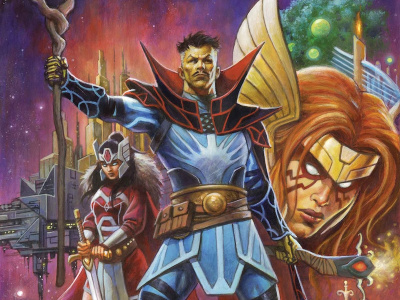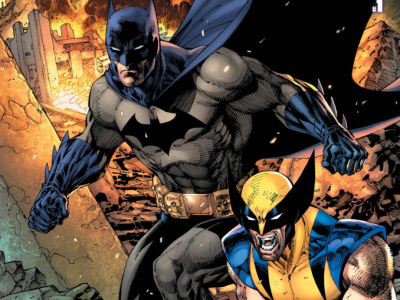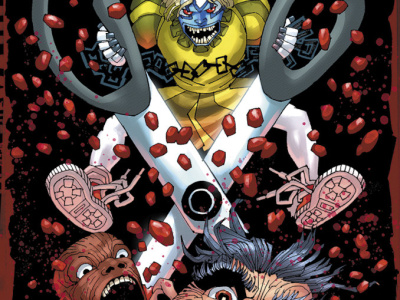Future Comics launched last summer with a distribution plan that was unusual to say the least -- the company sold direct to comic stores and did not do business with comic distribution powerhouse Diamond Comic Distributors (see 'Future Comics Launches this Month'). It later added FM and Cold Cut as its only distributors and continued to do business directly with retailers (see 'FM, Cold Cut To Offer Future Comics'). Now it's about to announce that it will be selling to Diamond for the first time early next year. We talked to founder and CEO Bob Layton about the founding of the company, the decisions they've made about distribution and their relationships with comic retailers, what they've got in the pipe, and the opportunities for getting their properties into the movies.
Tell us about the decision to start Future Comics.
That came pretty early on, I'd say, in the year 2000. Part of it was that Dickie [Giordano] and I had long since left our positions at DC and Valiant and were back in the freelance market, and not very pleased with the aesthetics that were being demonstrated generally in the artistic community. We felt like some of the things that we appreciated, and normally had taken for granted, had fallen by the wayside -- coloring specifically being one of them. I recall one job that we did together that we were so appalled by the coloring that we actually offered to have it re-colored and pay for it ourselves. Of course they wouldn't hear of that. We were concerned that numbers were shrinking in the business and that nobody was doing anything to bring new readers in. Instead, the industry seemed like it had taken a step to catering to the die-hard fans and not appealing to the general public.
The perception from my youth was that comics were incredibly accessible, that they were written for a general audience and that's really kind of gone by the wayside today. Everybody seems to be upset that there are no new people coming in, and, though they are trying things to get people into the comics genre, it doesn't seem to be taking. I think that part of that problem is that comics are being written for a niche' audience and not for a general one. As a result, they are not accessible and attractive to the civilian population. So Dick and I felt that we should try to do stuff that was, for lack of a better term, a little more mainstream -- stuff that can be read by anyone.
David Michelinie is also associated with the company; is he a principal also?
Yes. The way the company works is this: the actual company itself, the desks and chairs and the Future Comics logo all belong to me. I finance the company myself and pretty much pay for everything here. The properties, however--Freemind, Deathmask, Metallix--are owned jointly by Dave, Dick and myself. That way-- there is no confusion. The intellectual properties that we work with on a day-to-day basis are jointly owned by the three of us, but the actual physical company is mine.
So would it be fair to say that the reasons you struck out on your own were artistic? What could you accomplish on your own that you couldn't accomplish working for others?
I'll tell you my biggest problem with the entire industry. You remember when I was working at Valiant, I would show up at all these annual Distributor things to talk to retailers, and the general feeling I was getting from them in those last few years was that they felt that nobody cares about what they think. They are the guys actually selling the books but, generally, the companies tend to turn a deaf ear towards them. Having met most of the retailers at one time or another, Dick and I felt it would make sense to create a business where the retailers have some input, that we would have a company that's friendly to them and tries to give store owners a break with a product that they can actually make some money on. Also, they need to feel like they have some kind of input and that they aren't just coldly ordering things every month. I know how tough it is for most retailers just to keep the doors open, so we wanted to create a line of books that didn't 'break the bank', while, at the same time, maximizing their discounts and the service that they receive.
Is that why you made the decision not to sell through Diamond originally?
This has been misinterpreted. I'm going to clean it up for everybody and say it in no uncertain terms. Though I have been critical of the entire industry, and not just Diamond, the decision not to go with Diamond (at first) was strictly a financial one. When we initially talked to the people at Diamond and told them we were interested in publishing, we asked them what kind of deal we were going to get. After that, Dick and I sat down and ran the numbers. As a small independent company, without a huge amount of volume, the numbers simply didn't work. It just didn't work. I didn't see any way in the world that we could maintain profitability in this marketplace as an independent with the terms that we had been quoted. It was as simple as that.
I've always been on very good terms with Bill Schanes and Steve Geppi, whom I like very much. I have nothing against them personally; it's just that their deal didn't work for us. Dick and I are businessmen; we are not just comics professionals; we're businessmen. So we felt we had to do something. As an independent, how do we make our company healthy and profitable? As it turned out, the only solution was to cut the middleman out, at least at that particular time.
Are you talking about the spread between what Diamond bought at and what they sold to retailers at?
Exactly, after the discount we had to give up from our cover price, it was just not feasible for us.
But you did decide to sell to some of the smaller distributors like FM and Coldcut?
We said from the beginning that Future Comics would sell their products to anybody-- as long as it's on our terms. Basically, we've set up a complete system to produce entertainment and distribute it ourselves. As long as people wanted in on the deal, under our terms, we would sell to them. We're not flooding the market with two or three hundred thousand copies a month. There's plenty of latitude out there for other people to compete in the distribution business with us. I've talked with Wayne Markley at FM International, who's always been a gentleman, and we've had a friendly relationship. We're not talking about volumes so huge that it would steal tons of customers away from us or anything like that. Again, when people buy directly from Future Comics, they're going to get better discounts than they are going to get from FM anyway, because they are buying at a certain rate and selling at a certain rate, and we can obviously do that cheaper.'
I understand that now you are talking about making a change in your distribution arrangements, can you tell us about that?
To clarify that -- our distribution arrangement will not change-- in the sense that we will continue to operate and sell books to retailers directly from Future Comics' offices every month. That won't change--ever.
However, the interesting thing is that demand has become great on these books -- word of mouth is very good and we're producing a very high quality product. We've had on-going talks with Bill Schanes at Diamond, and we finally got to a point where we met on a common ground where the numbers started to work for us. So, I flew to Diamond's offices in Baltimore, Bill and I sat down, and we hammered out a deal that will allow us to be friendly competitors allowing Diamond to carry our books for the first time ever. As you probably know, our business is based on the Internet. We sell through the Internet via our Website for fans or from our e-commerce site for retailers. Surprisingly, there are a fairly large number of comic shops that don't do business on the Internet at all, and there's really no way to reach them except through other distribution means.
Again, keep in mind that we never originally intended to cut Diamond out of the loop. Some people felt that Future Comics was a revolution and our stance was basically anti-Diamond. Personally, I don't think the problems in the comic industry stem necessarily from Diamond. The problems of the industry, well you know -- 'The fish stinks at the head.' To me, the problem with the industry is a lack of vision -- something that we don't suffer from here at Future Comics. The three of us have a shared vision of what we want this company to be. I think that's something that people are picking up on. To make a long story short, Diamond came back to us with numbers that were acceptable, so now we're going to do business with them--as long as they understand that we will continue distributing ourselves. Again with Diamond, as with the other distributors, we offer our products faster and with a better discount to retailers when they order directly from us.
Your other distribution channels will all remain the same, you are just adding Diamond to those?
Yes, you and I talked about this at great length earlier. The way it will probably shake down is this: the larger retailers, the guys who have been in business for a long time, will probably do business directly with us, because they're going to get their books faster and at a lower cost. A lot of the smaller dealers, who don't want the hassle of having to order separately from us, will simply get our books from Diamond or one of the other distributors. There will be a little shakedown, but I think it will even out. However, the point is that our distribution system is up and running and it's been very successful. That being said, we have no intention of letting it go.
At the same time, we're in the entertainment business. Distribution is the method in which I get my entertainment in the hands of readers-- by any means possible. I like the distribution side because I get to talk to the retailers myself, and sometimes, I will make a sweetheart deal with somebody who's been extremely supportive of us. Or-- I'll sweeten the pot a little to get them to handle our books for the first time. The main drive that I have is getting our entertainment in the hands of readers, and I try to work with all the retailers that try to do that for me. If Diamond is going to help me do that-- fine. It's been misinterpreted that we're at war with Diamond, however, nothing could be further from the truth. It's strictly business, and now I think we have an equitable business arrangement. We'll see how it unfolds in the months to come.
When will Diamond start carrying your books?
We will be in the January Previews offering products for March shipping. They will include Metallix #4, Freemind #5, and Deathmask #1. Retailers should see this in a couple of weeks, when the catalog comes out.
What about your backlist, will that be available from Diamond?
We are currently negotiating that point and we should have that settled in another week or so. I believe there's some information about us that will go out in the weekly Diamond Dateline and we are going to be offering books to those unfortunate retailers who missed getting the books when we first offered them. Either through Diamond or through us, people who are just getting on board the Future Comics bandwagon will be able to get back issues.
Are any of your books sold out?
Pretty much. We held some copies back deliberately for back order purposes, but you must remember our business plan involves being frugal, not throwing good money after bad. The trouble with the comics business is that some people just throw a ton of money after stuff or they do things by rote, instead of giving it conscious thought. That's why you haven't seen us pump a ton of ad money into Wizard and various other venues, where I don't think it's proven that you get a lot of bang for your buck. We've tried a more grassroots approach with our product and we're going to keep our costs down. Therefore, we don't really need to print a lot of books in order to be profitable. It's not about flooding the market either. We basically strive to print-to-order as much as possible.
Are there any books that you have done that won't be available through Diamond as backlist?
Probably not, but then again, I have no idea what our orders are going to be like. I 'd say we are sitting on a few thousand of each book, but that could prove to be a drop in the bucket, I don't know. It's a little too soon to tell you whether we will have an appropriate number of books for reorders.
Tell us a little bit about your product pipeline.
We have a new book shipping in March--that's Deathmask. He made an appearance in Freemind #0. Deathmask is a character that David and I created back in the 1980s during our run on Iron Man. It was going to be an independent project, but the money fell through and it never got done. So we've been kind of sitting on this character for twenty-something years. Whoever said, 'no good idea is wasted--' was right. So, with a little bit of a modernized revamp, we're bringing this character back 'for the first time.'
(--laughs -- )
Where are you headed in terms of the number of books per month by the end of 2003?
Thanks for asking that, because I think this is one of the most interesting aspects of our business. When we started to create a new comic company with a new sort of approach, we wanted it to be reader-friendly and retailer-friendly. The plan we came up with was not to expand the line past four books -- ever! In terms of the Future Comics 'Hero' line, David, Dickie, and I want to insure that we can maintain creative control. I think that it's impossible to do that past four titles, because four books is something Dick, David and I can do on a monthly basis. Essentially, each book gets a week of our lives each month, and that works out just fine.
If you think about it from the fan's standpoint, the reader comes to the comic shop and he's going to plunk down X amount of dollars. If he's going to get all the Future Comics, that's not a huge investment; four books a month are not going to 'break the bank'. For the retailer, since we ship all four of our books at the same time, they save on freight. For example: a small store that orders only five copies of Freemind isn't eligible for our free shipping, which requires 20 books. However -- once we get all four books going, if a retailer orders five of each, they get their shipping free because they all ship out on the same week.'
Do you have any thoughts about bringing in additional creators, which might allow you to expand beyond four books per month?
Part of our business plan was to create a second line of books down the road that Dick would be in charge of -- basically a creator-owned line. Creative people would come to us with their concepts and we would set up a deal similar to what we do with our own Future Comics. Namely, we would distribute them and we would also offer them the advantages that we have with our representation in Hollywood and with any merchandising in partnership with them.
We realize that, as a publishing entity, we have to grow. But, at the same time, we want to keep the Future Comics line 'pure.' I think that's one of the biggest mistakes that most companies make -- they get a hit and they spin off three other books just like it. To me, they're just diluting their audience and weakening their property. I interested in creating readership and, to do that, we have to be consistent. If we're creating a consistent universe, I think it's vitally important that we don't flood the market and that we don't lose sight of our vision. Dave and I, creatively, have a very strong vision of our four characters and what we want to do with them. I believe that by being consistent and keeping the universe at a set number of books, we can build a strong readership.
Are you going to do any book collections of your comics?
We have a very unique plan to do something in the way of collected works, but I can't discuss it right now. That was one of the items that got Diamond very excited, because we are going to do something that's never been done before. It'll be something that will appeal to a much wider audience. We're now putting the budget plan together for that and we'll probably have something out there by summer. When the time comes, I will give you the word on what we are planning.
What can you tell us about your efforts to sell your Future Comics properties in Hollywood?
Well --I have to tell you that, so far, it's been rather effortless. The fellow who's representing us is a huge fan of David's and my work at Marvel on Iron Man, so when he heard we were starting a company, he got on-board very quickly. It's been moving pretty fast and furious, to be honest with you. As it stands right now, on the thirteenth of December, we've gotten bids from four executive producers. And, there's mention of a writer already. My last conversation with our representative at Energy Entertainment was that we might have a deal signed by the end of the month. I'm confident,with four different producers looking seriously at this material, it's very likely that we're going to get something produced and on the screen shortly. So far-- so good.
Anything else you want to say to the retailers who read ICv2?







